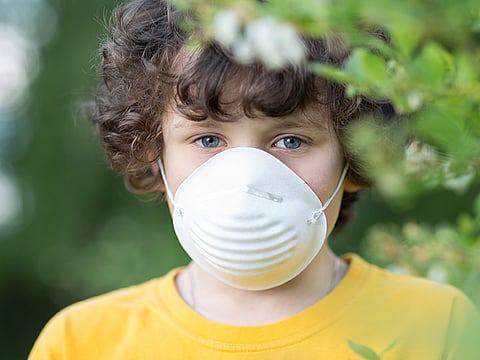The air you breathe
At this time of year, when the weather changes from summer to winter, changes in air quality can have a detrimental effect on your health, particularly if you suffer from a respiratory condition

Last month, The Ministry of Climate and Environment launched the UAE Air Quality Index. It’s clear that the government are taking the quality of the air we breathe seriously and this is reinforced by its inclusion as an issue in the National Agenda of the UAE Vision 2021.
Here in the UAE sand storms and dust storms are relatively common. They can significantly lower the quality of air and send pollution levels soaring. As we transition from summer to winter and the weather becomes less predictable, what effect could this be having on our health and in particular on people who suffer from respiratory conditions such as asthma?
Dr Bassam Mahboub, Head of Respiratory Department at Rashid Hospital, Dubai Health Authority (DHA) says that the quality of the air we breathe is a significant factor in our respiratory health. “Air quality is a big factor in respiratory diseases. The change in weather and air quality can be predisposing to respiratory infection and viruses, which can affect respiratory diseases such as asthma. Poor air quality can also negatively affect lung function.”
At this time of year, Dr Mahboub and his colleagues see a significant spike in the number of patients visiting DHA facilities reporting breathing-related issues. “We see more patients who come in [with] upper respiratory tract infections, coughs and other respiratory symptoms.”
Asthma
Asthma is a common disease that causes inflammation of the airways. It often occurs in childhood, although adults also suffer from the condition. “Asthma affects around 13 per cent of the population and it’s very common after a respiratory tract infection,” says Dr Mahboub.
“If you have an infection that reaches your chest and you start coughing and the infection doesn’t go away for three or four weeks, or if you start wheezing and there is a shortness of breath, these are common signs of asthma. Patients should be aware of this so that they receive the right treatments and diagnosis for asthma at primary healthcare centres.
“If people experience an acute episode, they can come to the emergency room, where we will refer them to a specialist. We also have a specialised clinic for severe cases of asthma and an allergy clinic in Rashid Hospital.”
Flu vaccination
When the weather is unstable and the air is full of sand and dust mites, it also increases people’s risk of infection. One way of protecting your health is to take a flu vaccination, particularly if you have a diagnosed respiratory issue. “First of all, I encourage everyone to take their flu vaccine, especially people with respiratory diseases or people with young kids in day care, because they bring lots of viruses with them,” says Dr Mahboub.
“The flu shot prevents influenza fever or influenza infection but it does not prevent the mild common cold that everybody gets. Secondly, I would ask everyone to make sure that when they move from a cold environment to a warmer environment, they do that slowly and that they try to cover their nose with something, especially if they have asthma or other respiratory allergies or diseases. Thirdly, I ask everyone to wash their hands properly as it’s an easy way of preventing the spread of infection.”
Dr Mahboub also recommends that people should be vigilant of the length of time that they suffer from symptoms for as this may be indicative of another respiratory issue.
“For people who have cold or flu symptoms that don’t improve in three or four days, they should seek consultation as they may have an allergy or a condition such as asthma.”
In DHA, as in other parts of the world, people are diagnosed and treated if they show the symptoms of upper respiratory tract infections. “We encourage people to wait between three and five days before seeking medical advice and starting a course of antibiotics,” says Dr Mahboub.
“Finally if you have a confirmed allergy or asthma, you should stick to your medication, especially at this time of year.”


